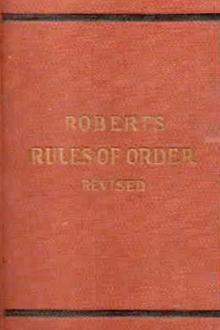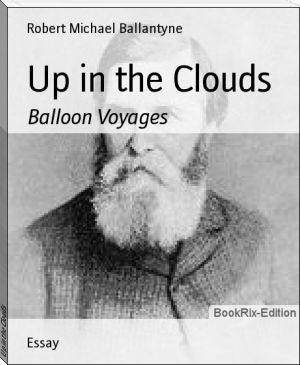Personal Reminiscences in Book Making - Robert Michael Ballantyne (free ebook novel .TXT) 📗

- Author: Robert Michael Ballantyne
Book online «Personal Reminiscences in Book Making - Robert Michael Ballantyne (free ebook novel .TXT) 📗». Author Robert Michael Ballantyne
"Then I suppose that you consider gambling, even to the smallest extent, to be sin?"
"I do."
"Under which of the ten commandments does it fall?"
"`Thou shalt not covet.'"
CHAPTER FOURTEEN.
TWO REMARKABLE DREAMS.
Some natures are better than others. There can be no question about that. Some dispositions are born moderately sweet, others are born slightly sour. If you doubt the fact, reader, go study Nature, or get you to an argumentative friend and dispute the point. We refuse flatly to enter into a discussion of the subject.
Look at that little boy sleeping there under the railway arch in the East End of London--not the boy with the black hair and the hook nose and the square under-jaw, but the one with the curly head, the extremely dirty face, and the dimpled chin, on the tip of whose snub nose the rising sun shines with a power that causes it to resemble a glowing carbuncle on a visage still lying in shadow.
That little boy's disposition is sweet. You can see it in every line, in every curve, in every dimple of his dirty little face. He has not been sweetened by training, he has had no training--at least none from man or woman with a view to his good. He has no settled principles of any kind, good or bad. All his actions are the result of impulse based on mere animal propensity, but, like every other human being, he has a conscience. At the time of his introduction to the reader his conscience is, like himself, asleep, and it has not as yet been much enlightened. His name is Stumpy, but he was never christened.
Critical minds will object here that a boy would not be permitted to sleep under a railway arch, and that London houses would effectually prevent the rising sun from entering such a place. To which we reply that the arch in question was a semi-suburban arch; that it was the last, (or the first), of a series of arches, an insignificant arch under which nothing ever ran except stray cats and rats, and that it spanned a morsel of waste ground which gave upon a shabby street running due east, up which, every fine morning, the rising sun gushed in a flood of glory.
Each fleeting moment increased the light on Stumpy's upturned nose, until it tipped the dimpled chin and cheeks and at last kissed his eyelids. This appeared to suggest pleasant dreams, for the boy smiled like a dirty-faced angel. He even gave vent to an imbecile laugh, and then awoke.
Stumpy's eyes were huge and blue. The opening of them was like the revealing of unfathomable sky through clouds of roseate hue! They sparkled with a light all their own in addition to that of the sun, for there was in them a gleam of mischief as their owner poked his companion in the ribs and then tugged his hair.
"I say, you let me alone!" growled the companion, turning uneasily on his hard couch.
"I say, you get up," answered Stumpy, giving the companion a pinch on the tender part of his arm. "Come, look alive, Howlet. I sees a railway porter and a bobby."
Owlet, whose nose had suggested his name, had been regardless of the poke, the tug, and the pinch, but was alive to the hint. He at once came to the sitting posture on hearing the dreaded name of "bobby," and rubbed his eyes. On seeing that there was neither policeman nor guard near, he uttered an uncomplimentary remark and was about to lie down again, but was arrested by the animated expression of his comrade's face and the heaving of his shoulders.
"Why, what ever is the matter with you?" he demanded. "Are you goin' to bust yourself wi' larfin', by way of gettin' a happetite for the breakfast that you hain't no prospect of?"
To this Stumpy replied by pulling from his trousers pocket four shining pennies, which he held out with an air of triumph.
"Oh!" exclaimed Owlet; and then being unable to find words sufficiently expressive, he rubbed the place where the front of his waistcoat would have been if he had possessed one.
"Yes," said Stumpy, regarding the coppers with a pensive air, "I've slep' with you all night in my 'and, an' my 'and in my pocket, an' my knees doubled up to my chin to make all snug, an' now I'm going to have a tuck in--a blow out--a buster--a--"
He paused abruptly, and looking with a gleeful air at his companion, said--
"But that wasn't what I was laughin' at."
"Well, I suppose it warn't. What was it, then?"
The boy's eyes sparkled again, and for some moments a half-suppressed chuckling prevented speech.
"It was a dream," he said at last.
"A dream!" exclaimed Owlet contemptuously.
"I hate dreams. When I dreams 'em they're always about bobbies and maginstrates, an' wittles, an' when other fellows tells about 'em they're so long-winded an' prosy. But I had a dream too. What was yours?"
"My dream was about a bobby," returned his friend. "See, here it is, an' I won't be long-winded or prosy, Howlet, so don't growl and spoil your happetite for that 'ere breakfast that's a-comin'. I dreamed--let me see, was it in Piccadilly--no, it was Oxford Street, close by Regent Street, where all the swells go to promynade, you know. Well, I sees a bobby--of course I never can go the length my little toe without seein' a bobby! but this bobby was a stunner. You never see'd sitch a feller. Not that he was big, or fierce, but he had a nose just two-foot-six long. I know for certain, for I'm a good judge o' size, besides, I went straight up to him, as bold as brass, and axed him how long it was, an' he told me without winkin'. The strange thing about it is that I wasn't a bit surprised at his nose. Wery odd, ain't it, eh, Howlet, that people never is surprised at anything they sees in dreams? I do b'lieve, now, if I was to see a man takin' a walk of a' arternoon with his head in his coat-tail pocket I'd take it quite as a matter of course.
"Well, w'en that bobby had told me his nose was two-foot-six inches long I feels a most unaccountable and astonishin' gush of indignation come over me. What it was at I don't know no more nor the man in the moon. P'r'aps it was the sudden thought of all the troubles that bobbies has brought on me from the day I was born till now. Anyhow, I was took awful bad. My buzzum felt fit to bust. I knowed that I must do somethin' to him or die; so I seized that bobby by the nose, and hauled him flat down on his breast. He was so took with surprise that he never made any struggle, but gived vent to a most awful howl. My joy at havin' so easily floored my natural enemy was such that I replied with a Cherokee yell. Then I gave his nose a pull up so strong that it well-nigh broke his neck an' set him straight on his pins again! Oh! Howlet, you can't think what a jolly dream it was. To do it all so easy, too!"
"Well, what happened arter that?" asked Owlet.
"Nothin' happened after that," returned Stumpy, with a somewhat sad expression on his usually gleeful visage. "It's a wery strange thing, Howlet, that dreams inwariably wanishes away just at the most interestin' p'int. Did you ever notice that?"
"Notice it! I should think I did. Why the dream that I had w'en I was layin' alongside o' you was o' that sort exactly. It was all about wittles, too, an' it's made me that 'ungry I feels like a ravagin' wolf."
"Come along, then, Howlet, an' you an' me will ravage somethin' wi' them browns o' mine. We'll 'ave a good breakfast, though it should be our last, an' I'll stand treat."
"You're a trump, Stumpy; an' I'll tell you _my_ dream as we goes along."
"Hall right--but mind you don't come prosy over me. I can't stand it no more nor yourself."
"You mind Dick Wilkin, don't you?"
"What--the young man from the country as I've see'd standin' at the dock gates day after day for weeks without getting took on?"
"That's him," continued Owlet, with a nod, as he shoved his hand into his trousers pockets. "He brought a wife and five kids from the country with him--thinkin' to better hisself in London. Ha! a sweet little town for a cove as is 'ard up to better hisself in--ho yes, certingly!" remarked the precocious boy in a tone of profound sarcasm.
"Well," he continued, "Dick Wilkin came to better hisself an' he set about it by rentin' a single room in Cherubs Court--a fine saloobrious spot, as you know, not far from the Tower. He 'ad a few bobs when he came, and bought a few sticks o' furniture, but I don't need for to tell _you_, Stumpy, that the most o' that soon went up the spout, and the Wilkins was redooced to beggary--waried off an' on with an odd job at the docks. It was when they first comed to town that I was down wi' that fever, or 'flenzy, or somethink o' that sort. The streets bein' my usual 'abitation, I 'ad no place in partikler to go to, an' by good luck, when I gave in, I lay down at the Wilkins' door. O! but I _was_ bad--that bad that it seemed as if I should be cleared out o' my mortal carcase entirely--"
"Mulligrumps?" inquired his sympathetic friend.
"No, no. Nothin' o' that sort, but a kind of hot all-overishness, wi' pains that--but you can't understand it, Stumpy, if you've never 'ad it."
"Then I don't want to understand it. But what has all this to do wi' your dream?"
"Everythink to do with it, 'cause it was about them I was dreamin'. As I was sayin', I fell down at their door, an' they took me in, and Mrs Wilkin nussed me for weeks till I got better. Oh, she's a rare nuss is Mrs Wilkin. An' when I began to get better the kids all took to me. I don't know when I would have left them, but when times became bad, an' Dick couldn't git work, and Mrs Wilkin and the kids began to grow thin, I thought it was time for me to look out for myself, an' not remain a burden on 'em no longer. I know'd they wouldn't let me away without a rumpus, so I just gave 'em the slip, and that's 'ow I came to be on the streets again, an' fell in wi' you, Stumpy."
"'Ave you never seen 'em since?"
"Never."
"You ungrateful wagibone!"
"What was the use o' my goin' to





Comments (0)